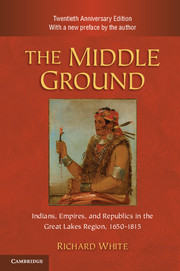Book contents
- Frontmatter
- Contents
- List of abbreviations
- Preface to the twentieth anniversary edition
- Introduction
- 1 Refugees: a world made of fragments
- 2 The middle ground
- 3 The fur trade
- 4 The alliance
- 5 Republicans and rebels
- 6 The clash of empires
- 7 Pontiac and the restoration of the middle ground
- 8 The British alliance
- 9 The contest of villagers
- 10 Confederacies
- 11 The politics of benevolence
- Epilogue: Assimilation and otherness
- Index
Preface to the twentieth anniversary edition
Published online by Cambridge University Press: 05 June 2012
- Frontmatter
- Contents
- List of abbreviations
- Preface to the twentieth anniversary edition
- Introduction
- 1 Refugees: a world made of fragments
- 2 The middle ground
- 3 The fur trade
- 4 The alliance
- 5 Republicans and rebels
- 6 The clash of empires
- 7 Pontiac and the restoration of the middle ground
- 8 The British alliance
- 9 The contest of villagers
- 10 Confederacies
- 11 The politics of benevolence
- Epilogue: Assimilation and otherness
- Index
Summary
It has been twenty years since I wrote The Middle Ground, and since then the book has led an interesting life without me. It has jumped disciplines, moving into literary criticism, anthropology, archaeology, and political science, and it has traveled the world – not just to other parts of North America, where I expected it to go, but also to Africa, Asia, Australia, and Europe. And it has time traveled, all the way back to antiquity in some cases.
I recognized soon after the book was published and achieved its initial success that what was good for a book might not be so good for its author. The danger in my case was that I would be trapped in the book and would spend the rest of my career sitting as the judge in the court of The Middle Ground. I would have to rule on whether any given example dragged into my court was an actual middle ground or a set of ordinary compromises posing as something grander.
There were several reasons why I wanted no part of this. The first was that the suspects came from worlds that I often knew little about. It took me ten years to write The Middle Ground, and the joy of it was the basic pleasure of writing any history: I went to places that seemed strange to me, and gradually the people there came alive and familiar enough so that they seemed more real to me than the people among whom I passed my days.
- Type
- Chapter
- Information
- The Middle GroundIndians, Empires, and Republics in the Great Lakes Region, 1650–1815, pp. xi - xxivPublisher: Cambridge University PressPrint publication year: 2010



